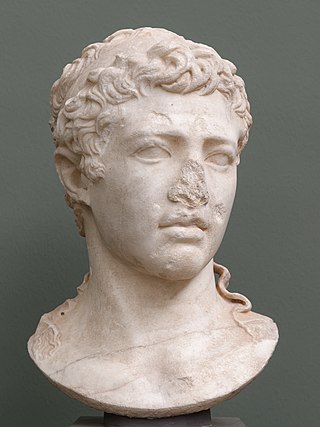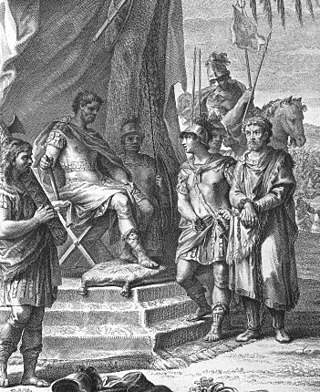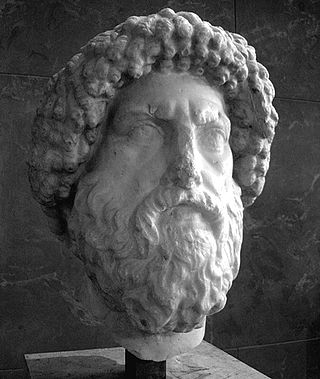| Bocchus II | |
|---|---|
| King of Mauretania | |
 | |
| Reign | 49 BC–33 BC |
| Predecessor | Mastanesosus |
| Successor | Interregnum |
Bocchus II was a king of Mauretania in the 1st century BC. He was the son of Mastanesosus, who died in 49 BC, upon which Bocchus inherited the throne.
| Bocchus II | |
|---|---|
| King of Mauretania | |
 | |
| Reign | 49 BC–33 BC |
| Predecessor | Mastanesosus |
| Successor | Interregnum |
Bocchus II was a king of Mauretania in the 1st century BC. He was the son of Mastanesosus, who died in 49 BC, upon which Bocchus inherited the throne.
He was the son of Mastanesosus, king of Mauretania. His father was identified from the Latin legends of the coins that give the exact lineage Rex Bocchus Sosi f or Sos fi and cannot be read other than "King Bocchus son of Sosus". By 49 BC, Mauretania seems to have been partitioned between Bocchus II and Bogud II, who are speculated to have been perhaps cousins or brothers, though the lineage is unknown. [1] Bocchus II ruled over the eastern part of Mauretania and had Iol as capital, while Bogud II ruled over the western part of Mauretania and had Volubilis as capital. The only known things about his rule were three events: his relations with Sittius, his part in the war against Juba I and the Pompeians, and the annexation of Western Mauretania. He was recognized as king by the Caesarean Senate in 49 BC, but he was previously hostile to Juba and it is unknown when exactly his reign began. It is certain that by this time, him and his brother Bogud, would plead in favor of Caesar against the Pompeians and their ally Juba I, king of Numidia. [2]
During the Roman civil war of 49–45 BC, Bocchus and Sittius invaded Numidia, overthrowing Massinissa II, whose kingdom was easily conquered, and seized Cirta within a few days, the capital of the kingdom of Juba I, who was thus obliged to abandon the idea of joining Metellus Scipio against Caesar. Bocchus's actions stopped there, but Sittius continued the fight, beating Saburra, the lieutenant of Juba, capturing Faustus Sulla, and Afranius, leading his fleet to Hippo Regius, where he caught Metellus Scipio's ship rushing. [2] At the end of the war, Caesar bestowed upon Bocchus part of the territory of Masinissa II, Juba's ally, which was recovered by Massinissa's son Arabio after Caesar's murder. [3] The kingdom of Mauretania thus extended to Ampsaga. The rest of the kingdom of Massinissa II, the region near the sea north of Cirta and the territory of Cirta, which had belonged to Juba, were given to Sittius. [2]
Dio Cassius says that Bocchus sent his sons to support Sextus Pompeius in Spain, while Bogud fought on the side of Caesar, and there is no doubt that after Caesar's death Bocchus supported Octavian, and Bogud Antony. [3]
During Bogud's absence in Spain, Bocchus II seized the whole of Mauretania, and was confirmed sole ruler by Octavian. Thus Bocchus II reconstituted a unification of a larger Mauretanian kingdom than Bocchus I and Sosus had ever known. He died without heir in 33 BC, donating his kingdom to Augustus, who, after a brief period of direct administration (33 BC - 25 BC), gave it in 25 BC to Juba II, the son of Juba I and king of Numidia. [2] Subsequently, Numidia (except of Western Numidia) was directly annexed to the Roman Empire as the part of the Roman province of Africa Proconsularis, whereas the kingdom of Mauretania (enlarged by Western Numidia) continued as a Roman client state under kings Juba II (25 BC – AD 23) and his son and successor Ptolemy of Mauretania (20 – 40) until it was annexed to the Roman Empire during the reign of Claudius. [3]

This article concerns the period 49 BC – 40 BC.
Year 46 BC was the last year of the pre-Julian Roman calendar. At the time, it was known as the Year of the Consulship of Caesar and Lepidus. The denomination 46 BC for this year has been used since the early medieval period, when the Anno Domini calendar era became the prevalent method in Europe for naming years.

Juba II of Mauretania was the son of Juba I and client king of Numidia and Mauretania. Aside from his very successful reign, he was a highly respected scholar and author. His first wife was Cleopatra Selene II, daughter of Queen Cleopatra VII of Ptolemaic Egypt and Roman Triumvir Mark Antony.

Numidia was the ancient kingdom of the Numidians in northwest Africa, initially comprising the territory that now makes up Algeria, but later expanding across what is today known as Tunisia and Libya. The polity was originally divided between the Massylii state in the east and the Masaesyli state in the west. During the Second Punic War, Masinissa, king of the Massylii, defeated Syphax of the Masaesyli to unify Numidia into the first unified Berber state for Numidians in present-day Algeria. The kingdom began as a sovereign state and an ally of Rome and later alternated between being a Roman province and a Roman client state.

Jugurtha or Jugurthen was a king of Numidia. When the Numidian king Micipsa, who had adopted Jugurtha, died in 118 BC, Jugurtha and his two adoptive brothers, Hiempsal and Adherbal, succeeded him. Jugurtha arranged to have Hiempsal killed and, after a civil war, defeated and killed Adherbal in 112 BC.

The Battle of Thapsus was a military engagement that took place on April 6, 46 BC near Thapsus. The forces of the Optimates, led by Quintus Caecilius Metellus Scipio, were defeated by the forces of Julius Caesar. It was followed shortly by the suicides of Scipio and his ally, Cato the Younger, the Numidian king Juba, and his Roman peer Marcus Petreius.

The Jugurthine War was an armed conflict between the Roman Republic and King Jugurtha of Numidia, a kingdom on the north African coast approximating to modern Algeria. Jugurtha was the nephew and adopted son of Micipsa, king of Numidia, whom he succeeded to the throne; he had done so by overcoming his rivals through assassination, war, and bribery.

Juba I of Numidia was a king of Numidia who reigned from 60 to 46 BC. He was the son and successor to Hiempsal II.

Bocchus, often referred to as Bocchus I for clarity, was king of Mauretania from c. 111 – 80 BCE. He was father-in-law to the Numidian king Jugurtha, with whom he initially allied against the Romans in the Jugurthine War, a lengthy and indecisive conflict.

Bogud was a Berber king who ruled the western part of Mauretania from 49 BC to 38 BC. He is speculated to have been either the cousin or the brother of Bocchus II, though the lineage is unknown. An important ally of Julius Caesar, Bogud later supported Mark Antony in the power struggle between Antony and Octavian. He was killed at the siege of Methone prior to the Battle of Actium and his territory was seized by Bocchus.

For nearly 250 years, Berber kings of the 'House of Masinissa' ruled in Numidia in modern day Algeria, and later in adjacent regions, first as sovereigns allied with Rome and then eventually as Roman clients. This period commenced by the Roman Army, assisted by Berber cavalry led by Masinissa at the Battle of Zama in 202 BC, and it lasted until the year 40 AD, during the reign of the Roman Emperor Gaius, also known as Caligula.
Publius Sittius was a Roman eques and mercenary commander. As a mercenary he was employed by king Bocchus II of East-Mauretania. Sittius fought for Bocchus against king Juba I of Numidia, capturing Juba's capital of Cirta and defeating the Numidian army under general Saburra. He also supported Julius Caesar in the civil war between Caesar and the Optimates, ultimately catching and killing Faustus Cornelius Sulla and Lucius Afranius and destroying Scipio's fleet off Hippo Regius. He was a personal friend of Marcus Tullius Cicero.
Masinissa II was the petty king of western Numidia with his capital at Cirta (81–46 BC). He was named after, or took his name after, his famous ancestor Masinissa I, the unifier and founder of the kingdom of Numidia.
Arabio was the last independent Numidian king, ruling the western region between 44 and 40 BC. According to Appian, he was a son of Masinissa II and probable grandson of Gauda, who had divided Numidia between his sons in 88 BC. He was of Massylian origin.
Mastanesosus was a Berber king of Mauretania and son of Bocchus I. He ruled from around 80 BC to 49 BC.
The Battle of Hippo Regius was a naval encounter during Caesar's Civil War which occurred off the coast of the African city of Hippo Regius in 46 BC. Metellus Scipio and a number of influential senators from the Optimate faction were fleeing the disastrous Battle of Thapsus when their fleet was intercepted and destroyed by Publius Sittius, a mercenary commander in the employ of the Mauretanian king Bogud, an ally of Gaius Julius Caesar's. Scipio committed suicide and all of the other senators were killed during the battle.
The Battle of Ascurum took place in 46 BC during Caesar’s Civil War and saw the defeat of a force under Pompey the Younger in battle against the Mauretanians.
Saburra was a Numidian general who served the king of Numidia, Juba I, and fought Julius Caesar during Caesar's Civil War. He managed to defeat one of Caesar's lieutenant, Gaius Scribonius Curio at the Battle of the Bagradas before eventually being killed in battle by a mercenary commander Publius Sittius, who was loyal to Caesar.
The Battle off Carteia was a minor naval battle during the latter stages of Caesar's civil war won by the Caesarians led by Caesar's legate Gaius Didius against the Pompeians led by Publius Attius Varus.
The Mulucha also known as Moulouya is a river in Ancient Mauretania : /ˈmu.lu.kʰa/, [ˈmʊɫ̪ʊkʰä]) which was used as a boundary between the Mauri and Massaesyli. Believed to be an ancient term of its modern name, the Moulouya River set in modern-day Morocco. Also alternatively known by its other historical name used later on, the Malva.